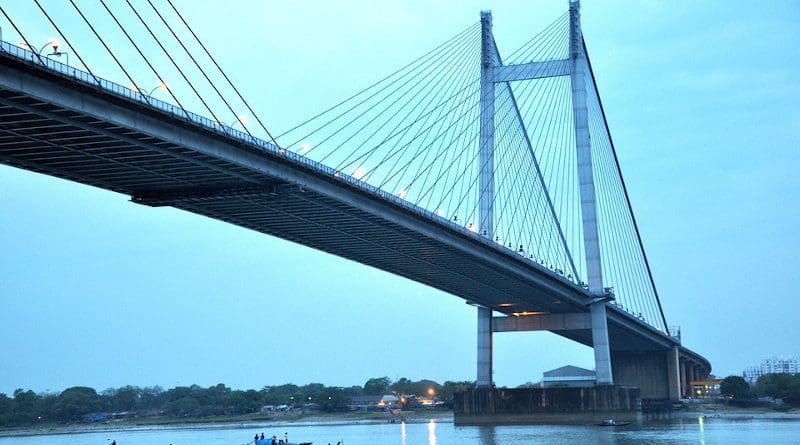Bengal Poll: A New Challenge To Act East Policy – Analysis
West Bengal and North East Region (NER) are at the geographical heartland of India for the axis to Act East policy. The proximity of both to South East Asia and East Asia is the bedrock for strategic policies to promote India’s relations with these regions. Nevertheless, West Bengal has an edge over NER. While NER is hamstrung by issues like lackluster connectivity and wide differences in cultural heritages with mainland of the country, West Bengal is poised the lever for Act East policy.
NER is crucial to India’s growing economic and strategic partnership with South East Asia and South Asia. In other words, NER has been focused the pivot for Act East policy. Given the lackluster connectivity between NER and East and South East Asia , Government of India has undertaken multi-million dollar projects to expand the connectivity. They are Bangladesh-China–India-Myanmar Economic Corridor project and the Kaladan multi-modal transit corridor project. Incidentally, a large part of these two projects pass through West Bengal.
Against these backdrop, the loss in the West Bengal election lent a new challenge to Centre for its Act East policy. Concern looms large over the growing political animosity between the Centre and State, which will hit the smooth running of the projects for Act East policy. As a result, projects will be delayed, causing an inimical impact on India’s economic and political relations with South East Asia and East Asia.
For example, Myanmar is the gateway to ASEAN. It is the only nation in ASEAN which shares both sea and surface transports with India through West Bengal. Analysts observed that West Bengal can act a Indian Silk Road to Myanmar, and then to ASEAN. Kalodan Multi-Model Transit Transport project under BIMSTEC connects Hoogly in West Bengal and Sittwe Port in Myanmar. The sea route will reduce the distance approximately 1328 km. At present, the narrow road through Siliguri in West Bengal is the connectivity between India and Myanmar. Loss of Bengal election is likely to put barriers to these projects.
West Bengal has unique advantage to become the lever to ASEAN connectivity and other East Asian countries because of its economic potential and industrialization. It can catalyze Bengal land for economic and business opportunities between India and ASEAN and other Asian countries. In the wake of China loosing cost competitiveness and outbreak of COVID 19 pandemic, resulting the business enterprisers in China looking for alternatives, West Bengal can be a propitious to establish a foundation for global value chain (GVC) manufacturing operations between India and ASEAN.
Nevertheless, India’s dissociation from RCEP ( Regional Comprehensive Economic Partnership) nudged a rethinking for Act East policy. Former External Ministry Foreign Secretary argued “Is India retreating from Act East policy?”. He observed that India was downgrading EAS (East Asia Summit). The last EAS was attended by External Affairs Minister than Prime Minister.
Analysts observed that withdrawal from RCEP can have overarching impact on Act East policy. This may act deterrent to the main objective of Act East policy. Since ASEAN and China were engaged in FTA in 2010, it has opposite reaction to India-ASEAN trade vis-à-vis China- ASEAN trade. India witnessed a fall in export to ASEAN and increase in imports from ASEAN, as compared to increase in China’s export to ASEAN.
Incidentally, global turmoil – US-China trade war and COVID 19 pandemic – has changed the world landscape for development. The US-China trade war slowed down world’s economic growth to 2.7 percent in 2019 and COVID 19 is expected to push the world economy in recession. Both these are likely to bid a new challenge to RCEP significance in global trade and economy vis-a- vis ASEAN pre-eminence in the trade block.This leaves a room to tinker the re-thinking on Act East policy, which was subdued after the dissociation from RCEP.
West Bengal continues to reel under the sagging industrialization even after the Communist government was uprooted. The euphoria of the investors to invest in the State faded with new Chief Minister Mamata Banerjee’s repeated abuse of Centre’s economic policies and haunting of Tata Nano project, which damaged her image of a pro-industry leader.
According to Economic Survey of West Bengal, the State is ahead of many states in strong small scale sector base. One of the pre-requisite for GVC partnership is strong SMEs (Small and Medium Scale Enterprise). This sector produces a slot of the final product. In this perspectives, West Bengal can provide an ideal place for manufacturing as Supporting Industry base for the industries in ASEAN.
Besides, West Bengal has a distinct advantage to peer a trading hub for India to export to its neighbor. Geographical proximity and surface connectivity to Bangladesh, Nepal, Bhutan and Myanmar produce ample opportunities to be the Rotterdam of India. The surface transport, which is benign to low cost logistic, unleashes greater opportunities to augment border trade with these countries. West Bengal is the main entry route for border trade with these countries. Huge volume of unofficial trade also takes place through West Bengal borders.
At present, Kolkata and Siliguri serve the main hubs for exporting to these countries across the borders. But, they are entangled by narrow road and time consuming. The ongoing projects, Bangladesh-China–India- Myanmar Economic Corridor project and Kaladan multi-modal transit corridor project, will accelerate the scope and significance of West Bengal for border trade with these countries.
In summing up, besides a boost to Bengali sentiment, the verdict of people of West Bengal’s to support Mamata for third term was to perk up the State’s economic health and generate more employment. In this perspective, the state’s geographical proximity to the India’s neighbor should be focused to revitalize the industrialization and vie for a trading hub for North East and its neighbor.

